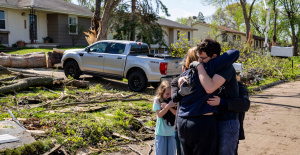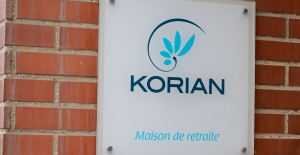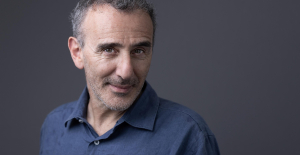It was charming when the Prime Minister rediscovered Angela Merkel's dictum in March and shouted "We can do it!". What was meant was the admission of Ukrainian refugees to North Rhine-Westphalia. He was right: for a long time we hardly heard any complaints. An enthusiastic wave of helpfulness washed away problems such as accommodation. And so Hendrik Wüst was able to sing a few more we-can-do-that-songs of praise for the helpful NRW. But that is no longer enough.
Wüst has to answer how we and especially the municipalities can do it. At the beginning of the week, their representatives to the Minister of Integration, Josefine Paul (Greens), described their distress in sometimes drastic words. They combined this with the appeal that the country must "finally deliver" and, for example, create many thousands of additional accommodation places in the near future. The Association of Towns and Municipalities warned that NRW was facing a situation like that of 2015, and that “calls for help were being registered from more and more parts of the state”.
According to this, 40,000 asylum applications should be made in NRW by the end of 2022 – 25 percent more than in the previous year. But refugees are already being housed in gyms in many places, and according to the NRW City Council, there is hardly any living space left. What also worries the municipalities is the unpredictability of the coming immigration: It is known that around 211,000 Ukrainians were living in NRW at the beginning of September and that the federal government is expecting more.
But no one knows how many will come. It is also known (and confirmed by the Federal Ministry of the Interior) that the number of non-Ukrainian refugees in particular is currently increasing. In this group in particular, it is unclear how many to expect. That's why the Wüst associations are calling for the seriousness of openly acknowledging the potential for stress in the situation.
Yes, that would be a good idea. Wüst should prepare the population for what lies ahead. Of course, the federal government will take over a large part of the payments under the Asylum Seekers Benefits Act (between 2016 and 2021 that was well over 120 billion euros). But the state will also have to do a lot – if “a second 2015” announces itself, as the municipal associations fear.
NRW has had to raise almost seven billion euros for asylum seekers since 2015. The well over 500,000 people who immigrated to NRW between 2015 and 2017 (after deduction of emigrants) increased bottlenecks on the housing market, in day care centers and schools. And they increased poverty.
In addition, at 994 of 2787 NRW elementary schools, the proportion of students with an immigrant background is now at least 50 percent, which the Ministry of Education classifies as a major challenge. Yes, such problems can be mitigated - but only through massive investment and government intervention. And this in the middle of a huge inflation and energy crisis. So anyone who shouts “We can do it” now has to answer the question: How?

 Israel-Hamas war: Gaza between hope of truce and fear of Israeli offensive in the South
Israel-Hamas war: Gaza between hope of truce and fear of Israeli offensive in the South “Mom, Dad, please don’t die”: in the United States, a nine-year-old child saves the lives of his parents injured in a tornado
“Mom, Dad, please don’t die”: in the United States, a nine-year-old child saves the lives of his parents injured in a tornado War in Ukraine: Putin orders nuclear exercises in response to Macron and “Western leaders”
War in Ukraine: Putin orders nuclear exercises in response to Macron and “Western leaders” Mexico: the last moments of surfers found in a well, killed with a bullet to the head
Mexico: the last moments of surfers found in a well, killed with a bullet to the head A baby whose mother smoked during pregnancy will age more quickly
A baby whose mother smoked during pregnancy will age more quickly The euro zone economy grows in April at its best pace in almost a year but inflationary pressure increases
The euro zone economy grows in April at its best pace in almost a year but inflationary pressure increases Children born thanks to PMA do not have more cancers than others
Children born thanks to PMA do not have more cancers than others Breast cancer: less than one in two French women follow screening recommendations
Breast cancer: less than one in two French women follow screening recommendations “A potential environmental disaster”: Paris town hall opposes an oil drilling project in Seine-et-Marne
“A potential environmental disaster”: Paris town hall opposes an oil drilling project in Seine-et-Marne The governor of the Banque de France pleads for the development of French and European AI
The governor of the Banque de France pleads for the development of French and European AI Clariane (ex-Korian) announces a sale of its home hospitalization activities
Clariane (ex-Korian) announces a sale of its home hospitalization activities To everyone's surprise, the Hades 2 event video game is released in early access
To everyone's surprise, the Hades 2 event video game is released in early access The Origin of the World, exhibited at the Center Pompidou Metz, target of an “artistic performance”
The Origin of the World, exhibited at the Center Pompidou Metz, target of an “artistic performance” Threatened with death for having insulted the mobilized pro-Palestinian students, Élie Semoun files a complaint
Threatened with death for having insulted the mobilized pro-Palestinian students, Élie Semoun files a complaint Vienna, Paris, Milan celebrate the 200th anniversary of Beethoven's 9th Symphony
Vienna, Paris, Milan celebrate the 200th anniversary of Beethoven's 9th Symphony Cannes Film Festival: call for strike one week before opening
Cannes Film Festival: call for strike one week before opening Omoda 7, another Chinese car that could be manufactured in Spain
Omoda 7, another Chinese car that could be manufactured in Spain BYD chooses CA Auto Bank as financial partner in Spain
BYD chooses CA Auto Bank as financial partner in Spain Tesla and Baidu sign key agreement to boost development of autonomous driving
Tesla and Baidu sign key agreement to boost development of autonomous driving Skoda Kodiaq 2024: a 'beast' plug-in hybrid SUV
Skoda Kodiaq 2024: a 'beast' plug-in hybrid SUV The home mortgage firm rises 3.8% in February and the average interest moderates to 3.33%
The home mortgage firm rises 3.8% in February and the average interest moderates to 3.33% This is how housing prices have changed in Spain in the last decade
This is how housing prices have changed in Spain in the last decade The home mortgage firm drops 10% in January and interest soars to 3.46%
The home mortgage firm drops 10% in January and interest soars to 3.46% The jewel of the Rocío de Nagüeles urbanization: a dream villa in Marbella
The jewel of the Rocío de Nagüeles urbanization: a dream villa in Marbella Europeans: David Lisnard expresses his “essential and vital” support for François-Xavier Bellamy
Europeans: David Lisnard expresses his “essential and vital” support for François-Xavier Bellamy Facing Jordan Bardella, the popularity match turns to Gabriel Attal’s advantage
Facing Jordan Bardella, the popularity match turns to Gabriel Attal’s advantage Europeans: a senior official on the National Rally list
Europeans: a senior official on the National Rally list Blockade of Sciences Po: the right denounces a “drift”, the government charges the rebels
Blockade of Sciences Po: the right denounces a “drift”, the government charges the rebels These French cities that will boycott the World Cup in Qatar
These French cities that will boycott the World Cup in Qatar Foot: Italian football protests against a government project which aims to monitor club finances
Foot: Italian football protests against a government project which aims to monitor club finances Champions League: “We are ready for anything,” warns Edin Terzic before PSG-Dortmund
Champions League: “We are ready for anything,” warns Edin Terzic before PSG-Dortmund Premier League: David Moyes to leave West Ham at end of season
Premier League: David Moyes to leave West Ham at end of season Transat CIC: Yoann Richomme winner in the wake of Tabarly, Poupon, Peyron, Desjoyeaux...
Transat CIC: Yoann Richomme winner in the wake of Tabarly, Poupon, Peyron, Desjoyeaux...


















